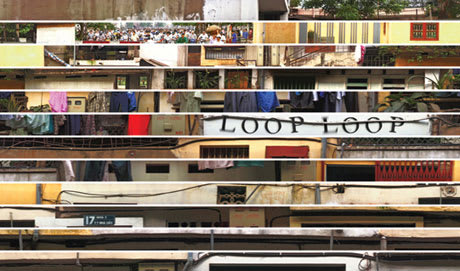A lot of what we have here involves architecture, familial alienation and cultural differences in shared space. It's a thematically uneven grouping of shorts that range from captivating to unintentionally humorous. Unfortunately, the majority of this program leans to the latter category, either fumbling around the world of video art or making awkward political statements.
Take "Loop Loop," the opening short, which is apparently an impressive feat of editing but really just looks more like a bunch of compressed images randomly slapped together. But hey, they move, just like a choo choo train. This only lasts for a minute or two before aboriginal gangsta rap rears its head in "Overburden," a short film about the exploitation of land in Northern Alberta by oil companies and the impact on the native way of life. You mean corporations care more about money than they do people?
For those feeling bad about disparate beings, "The Lost Tribes of New York City" gives voice to the diversity of New York, in the form of talking mailboxes and telephones. This one could be viewed as either amusing or disturbing depending on one's frame of mind.
Thankfully, "Maid to Oust" saves the program, as it's a beautifully shot tale of lifestyle resentment and the bizarre human custom of spending more time at work than at home. Here, a maid finds her living quarters invaded by unwelcome guests and decides to make herself more at home in the abode of one of her clients, much to their surprise. Folks should enjoy this one while it lasts, as "CHEESE..." offers little more than a bickering Kurdish family trapped in their basement during the Iraq war.
"Rains" is thoughtful and sombre animation about what happens when an unexpected rainstorm descends on a crowded city, and "Without You" is an assault of visuals and editing meant to point out the shapes or beauty, or something, in everyday objects. It's brief.
The next short, "Foreign," examines cultural abandonment when a Turkish mother visits her son in Berlin and is met with strange resentment and hostility. This sharp examination of spatial influence proves the last interesting thing in the program, as "The Man Who Built My Childhood" is simply a glib look at a Manitoba architect.
Take "Loop Loop," the opening short, which is apparently an impressive feat of editing but really just looks more like a bunch of compressed images randomly slapped together. But hey, they move, just like a choo choo train. This only lasts for a minute or two before aboriginal gangsta rap rears its head in "Overburden," a short film about the exploitation of land in Northern Alberta by oil companies and the impact on the native way of life. You mean corporations care more about money than they do people?
For those feeling bad about disparate beings, "The Lost Tribes of New York City" gives voice to the diversity of New York, in the form of talking mailboxes and telephones. This one could be viewed as either amusing or disturbing depending on one's frame of mind.
Thankfully, "Maid to Oust" saves the program, as it's a beautifully shot tale of lifestyle resentment and the bizarre human custom of spending more time at work than at home. Here, a maid finds her living quarters invaded by unwelcome guests and decides to make herself more at home in the abode of one of her clients, much to their surprise. Folks should enjoy this one while it lasts, as "CHEESE..." offers little more than a bickering Kurdish family trapped in their basement during the Iraq war.
"Rains" is thoughtful and sombre animation about what happens when an unexpected rainstorm descends on a crowded city, and "Without You" is an assault of visuals and editing meant to point out the shapes or beauty, or something, in everyday objects. It's brief.
The next short, "Foreign," examines cultural abandonment when a Turkish mother visits her son in Berlin and is met with strange resentment and hostility. This sharp examination of spatial influence proves the last interesting thing in the program, as "The Man Who Built My Childhood" is simply a glib look at a Manitoba architect.




